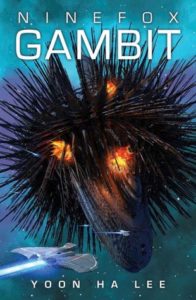
I’d heard enough glowing reviews—not to mention the Locus Award win and Nebula and Hugo nominations—to have pretty high expectations for Ninefox Gambit, and it certainly lived up to them. Yoon Ha Lee’s debut space fantasy delivers some fascinating psychological warfare on both a grand and a personal scale, interspersed with moments of levity to break the tension and round out the characters.
In the short few years since its publication, Ninefox Gambit has already developed a bit of a reputation for starting in the middle of things, and it’s well-deserved. Lee drops us in the middle of a war, with Captain Kel Cheris using a complicated system of mathematical magic (disguised as technology) to put down a heretical rebellion. And those heretics? They threaten the magic-tech, which relies not just upon intricate geometries, but also on the psychological states of the people around it. If they do not follow the Empire’s calendar, the magic-tech ceases to function. So calendrical heresy becomes very, very important.
This brings us to the main thrust of the story, where another group of heretics has taken a nearly impregnable fortress. To fight them, Cheris is imbued with the consciousness of Shuos Jedao, a legendary general who has never lost a battle. He also had his body destroyed centuries earlier after massacring his own forces in addition to the enemy. So Cheris gets to fight a war with a genius and a psychopath in her head.
The book stands and falls on Jedao’s character, both his tactical acumen and his relationship with Cheris. And the calendrical magic-tech really lets him shine. Its dependence on the people’s beliefs sets the stage for psychological warfare, and the dearth of detailed explanation allows him to act in ways that the reader couldn’t see coming. But, while the calendrical system enables Jedao to steal the show, it also can serve to distract from the story. The relationship between Jedao and Cheris is excellent, and even with all the war going on, it’s this partnership between the straight-laced soldier and the mad genius that makes the book great. But there’s so much technobabble about the mathematics underlying the magic-tech that it can be a distraction. In order to get the most out of the story, I recommend not trying to understand the details. But figuring out which details are important and which should be ignored is a non-trivial undertaking, and it puts too much responsibility on the reader—the technobabble is an unnecessary impediment to enjoyment of the novel.
And it’s still a really good novel. The character interactions are great, the emotional moments hit hard, and there are even some moments of humor in the brief glimpses into the perspective of the heretics and their calendrical mockery. And while the main plot does conclude, there is an excellent setup for what I assume will be the overarching plot of the trilogy as a whole. But even as a really good novel, a little less obfuscation could’ve taken it to another level.
Recommended if you like: odd partnerships, psychological depth, mad geniuses, imperial scheming, space fantasy.
Overall rating: 15 of Tar Vol’s 20. Four stars on Goodreads.
Yours in calendrical heresy,
T. V.
